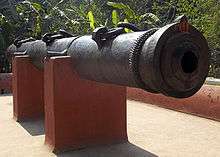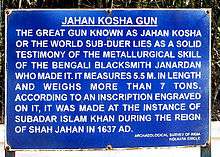Jahan Kosha Cannon
Jahan Kosha Cannon (also known as the Great Gun) literally means the Destroyer of the World. It is placed in the Topekhana a quarter of mile to the south east of the Katra Mosque, in the town of Murshidabad, West Bengal, India. Topekhana was the Nawab's Artillery Park and the entrance gate of the old capital of Bengal, Bihar and Orissa, the city of Jahangir Nagar. It is protected on the east by the Gobra Nala, locally known as the Katra Jheel. Here, the Jahan Kosha Cannon is laid to rest. Earlier, it rested on a carriage with wheels and was surrounded by the roots of a Peepal tree.[1] Gradually, this cannon had been lifted four feet from the ground The roots surrounded it so beautifully that it had no possibility of falling down. It used to be astonishing to see the big and heavy cannon hanging at a height of 4 feet. Later, it was freed from the tree's roots. The wheels have disappeared but the iron-work of the carriage and the trunions are still visible. The cannon is made of ashtadhatu or 8 metals, namely silver, gold, lead, copper, zinc, tin, iron and mercury.

The cannon is more than 7 tons in weight. It is 17 feet and 6 inches in length and 3 feet in width. It has a girth of 5 feet at the touch hole end. The circumference of its mouth is more than one foot. The radius of the slit for containing the fire is one and a half inches. In order to fire this cannon once, 17 kilograms of gunpowder was needed. The orifice is of 6 inches. It still shows no sign of rust.


This grand cannon was made by Janardan Karmakar. Karmakars were blacksmiths, but he was a gunsmith. He made it under the instructions of Daroga Shree Mohammad and under the supervision of Hara Ballav Das in 1637 AD. He was from Dacca. The cannon was named in Dacca, when Shah Jahan was the Mughal emperor at the instance of Islam Khan, who was the Subedar of Bengal. This is confirmed by an inscription engraved on it. However, the cannon has several other names like the "Great Gun", the "Destroyer of the world", the "Conqueror of the universe", the "World Subduer" and so on.
The cannon is maintained by the Archaeological Survey of India.
References
External links
| Wikimedia Commons has media related to Jahan Kosha Cannon. |